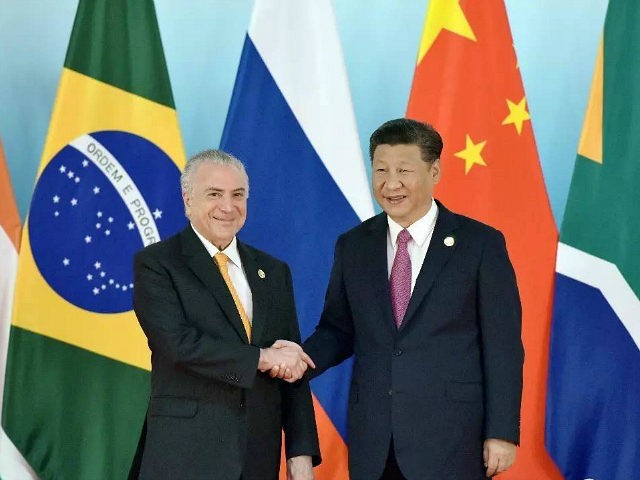WASHINGTON, DC – China’s investment in Brazil, the largest country in Latin America, has been growing by the year, largely under the radar of the United States, according to two experts.
Chinese foreign direct investment in Brazil grew 37 percent between 2010 and 2016, said Andre Soares, counselor at Inter-American Development Bank, at a discussion at the George Washington University’s Elliot School on Monday.
Soares said Chinese companies initially had difficulties entering the Brazilian market but learned it was much easier to do with Brazilian partners.
“After six years, China was able to learn how to navigate Brazilian bureaucracy,” he said.
David Shambaugh, director of the China Policy Program and professor of political science at the George Washington University Elliot School of International Affairs, said: “FDI is flowing into Brazil like a tsunami.”
He observed that, on a recent trip to Brazil, his flight was filled with Chinese businessmen.
“Chinese companies and state-owned enterprises are now acquiring Brazilian companies,” likely in sectors that reflected China’s own indigenous development strategy, he said.
“They’re trying to set off those weaknesses,” he said, which included nanotechnology, biotechnology, robotics, and aerospace. “Brazil has competence in those four at least.”
Shambaugh said Brazil is having difficulties tracking where the investment is actually going.
“Everyone [is] worried about where it’s going,” he said. “[The government] can’t follow it, can’t control it, except in land transactions.”
Soares also expressed concern that 80 percent of Brazil’s exports to China were concentrated in four sectors, whereas those same sectors account for 40 percent of exports to the world.
He said 426 industrial products that Brazil has a comparative advantage with worldwide have “little or no market share” in China.
Brazil is also facing the effects of deindustrialization, but it is not clear to what extent China is to blame, he said.
He said the “root causes” are a series of policies and decisions that make Brazil less competitive but acknowledged “there is a negative impact in areas where China subsidizes its production.”
Shambaugh said China and Brazil’s relationship is deepest in the commercial sector, but there is an “institutionalized” diplomatic relationship as well, guided by three main documents that detail the relationship in just about every area.
Those documents are the U.S.-Brazil Joint Action Plan, the China-Brazil High-Level Cooperation and Coordination Committee, and the Global Strategic Dialogue, he said.
China does not have as developed a relationship, or a similar set of documents, with any other Latin American country, he noted.
China and Brazil also have a military relationship that is “not insignificant,” Shambaugh said.
There is long-standing cooperation in aerospace and outer space, Shambaugh said. The avionics for China’s J20 fighter came from Brazil and Israel, he said.
“The [Defense Intelligence Agency is] watching China’s military moves in all Latin American countries with growing concern.”
“I think we’re going to see an increasing Chinese military presence … In coming years, the U.S. is going to wake up and say, ‘Gee, how did that happen?'”
But, he added, the relationship so far is “pretty much a paper document. There’s not a lot of ‘there there.'”
Limiting factors of the relationship are geography, resources, and expertise, he said.
“It costs a lot of money to buy business class tickets,” he said. “It costs a lot of money to implement a plan like this. It requires expertise in dozens of areas.”
“Nonetheless, on paper, it’s a remarkably diverse relationship.”

COMMENTS
Please let us know if you're having issues with commenting.